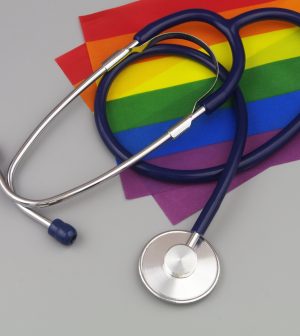- 8 Ways to Increase Dopamine Naturally
- 7 Best Breads for Maintaining Stable Blood Sugar
- Gelatin vs. Collagen: Which is Best for Skin, Nails, and Joints?
- The Long-Term Effects of Daily Turmeric Supplements on Liver Health
- Could Your Grocery Store Meat Be Causing Recurring UTIs?
- Are You Making This Expensive Thermostat Error This Winter?
- Recognizing the Signs of Hypothyroidism
- 10 Strategies to Overcome Insomnia
- Could Artificial Sweeteners Be Aging the Brain Faster?
- Techniques for Soothing Your Nervous System
Lesbian & Gay Teens Have Twice the Odds for Binge-Eating Disorders

Stigma can take a toll on lesbian, gay and bisexual teens, leading to high rates of binge-eating disorders, researchers say.
Compared to their non-LGBTQ peers, lesbian, gay and bisexual teens are more than twice as likely to report binge eating, according to a new study.
Bullying, discrimination and stigma because of sexual orientation can be stressors that lead to poor self-esteem and disordered eating, explained lead study author Dr. Jason Nagata. He is an associate professor of pediatrics at the University of California, San Francisco.
“Binge eating can result in psychological effects like depression and anxiety, and long-term physical health problems, including diabetes and heart disease,” Nagata added in a university news release.
With binge eating, the individual frequently consumes unusually large amounts of food and feels unable to stop eating. It is the most common eating disorder in the United States, but is understudied and often misunderstood, according to background notes in the study.
The researchers analyzed data from more than 10,000 adolescents aged 10 to 14 years old who were part of the Adolescent Brain Cognitive Development Study, the largest long-term study of brain development and child health in the United States. Data was from 2018 to 2020.
Parents were asked about their children’s eating behaviors. Youths reported their sexual orientation.
“Adolescents with eating disorders should seek professional help. Eating disorders are best supported by an interdisciplinary team, including a mental health, medical, and nutrition provider,” Nagata said. “Given the higher risk of eating disorders in LGBTQ+ youth, it is important that health care providers foster a welcoming environment to youth of all sexual orientations and genders.”
Kids from low-income families also had higher odds of binge eating, according to the report published online Oct. 13 in the Journal of Eating Disorders.
More information
The National Eating Disorders Association has more on binge-eating disorder.
SOURCE: University of California, San Francisco, news release, Oct. 13, 2023
Source: HealthDay
Copyright © 2026 HealthDay. All rights reserved.










